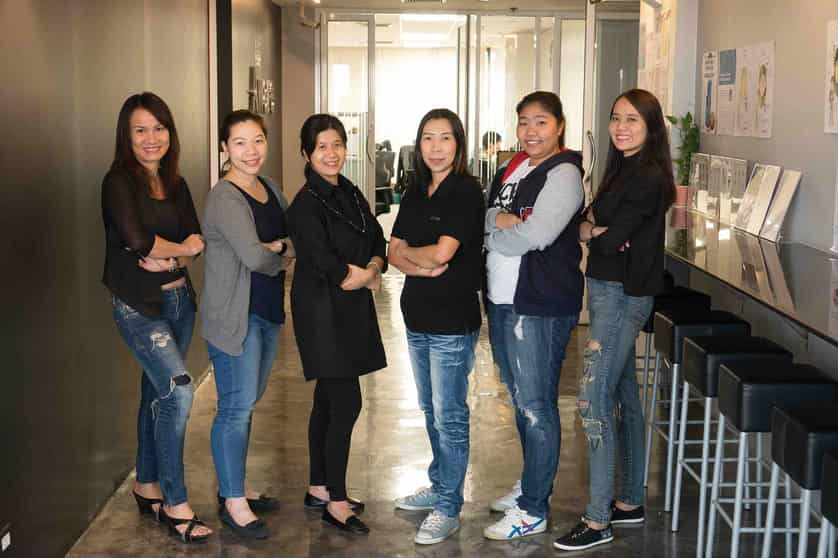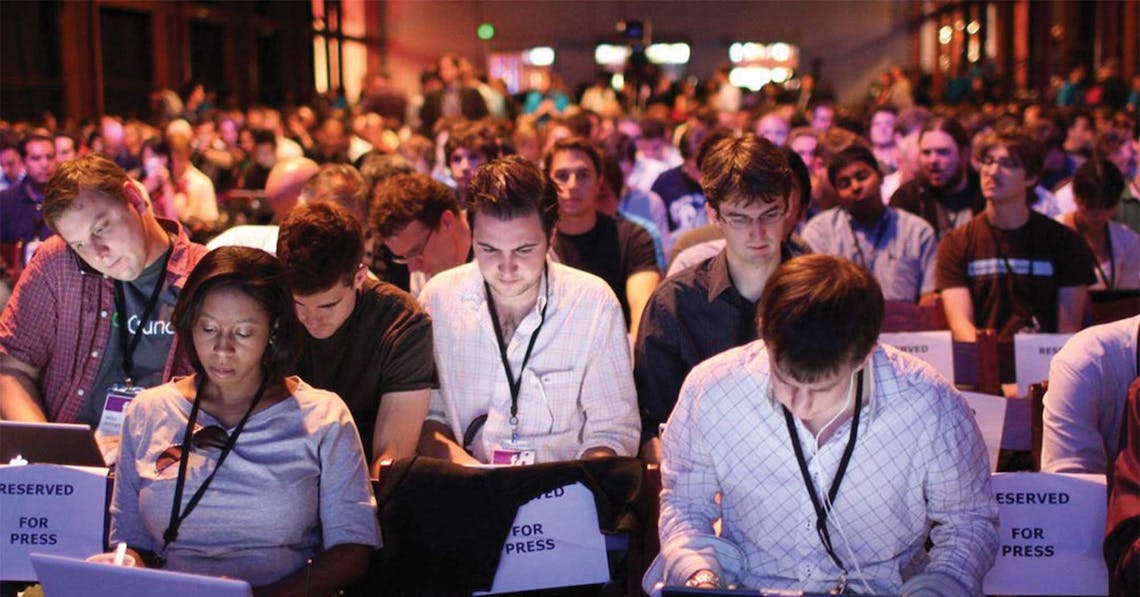When we think of iconic figures that have worked, or are working, at the apex of the computer tech industry, for the most part it is men’s names that populate our thoughts. The industry is seen as a masculine domain, and if you look at the ratio of women-to-men employed, or holding leadership positions, within the tech milieu you see a vast disproportion in male to female employees; from developers to CEOs, jobs in the tech industry are traditionally filled by men.
Why this has emerged in the industry is difficult to figure out. Perhaps some vocations are actually more attractive to males, such as a man’s clichéd proclivity for fixing up cars, but you would think something like computer technology would be a unisexual vocation. Given the meteoric rise of computer tech and how it permeates our lives and the global job market, we might ask why so many women are still not seemingly involved in its creation or evolution, or at least are only playing backbench roles to men in the industry.
Disproportions
Today higher management positions over the entire global job market are still mostly the domain of men. This is in spite of women outnumbering men in attendance and graduation rates at universities globally, according to a study taken by Yale University. Research by the Organisation for Economic Co-operation and Development (OECD) also shows that women are outperforming men at the high school and university level in most countries throughout the world. However, UN statistics reveals that women still earn considerably less than men, on average throughout the world, 24% less.
Tech companies such as Google, Apple, and Facebook have made efforts to attract more women, with Facebook and Apple going as far to pay $20,000 for women to freeze their eggs. In terms of the tech giants in the US women make up very little of the workforce. At Microsoft the man to woman ratio in leadership roles stands at 77-23%; Apple 72-28%. Facebook is reported as having the exact same ratio as Apple. Google is 79-21%. The amount of actual employees in any position in these companies sees ratios even further apart, with Twitter’s 3,600 employees being 90% male.
It’s not that women perform any worse in tech at the school level, at least in the UK they outperform their male counterparts at GSCE and at Computing and ICT A Levels.” It does, however, go on to say that at more advanced levels women participation drops, with females only accounting for 12% of people applying to take a computer science degrees, and only 13% of those actually taking a com-sci degree in the UK.
Is Thailand seeing a reverse of the trend?
While Thailand offers little government or independent research on woman in the ICT sector. UNESCO, however, last year released a report that revealed that Thailand was way ahead of most countries in region relating to women working STEM (Science, technology, engineering and mathematics) fields. Compare, for instance, Thailand 53% share of female researchers working in the field of Science, technology and innovation, compared to Japan’s 15% or South Korea’s 18%. Thailand is generally seen as progressive in this area.

Katherine ‘Kathy’ Aphaivongs, a Thai/American Managing Director for SavingsAsia (Thailand) Company Limited and Masii Group (Thailand) Company Limited, both B.Grimm joint venture companies, is currently tasked to launch Masii.com, a financial comparison portal, as well as grow the comparison platform into other ASEAN countries. Katherine told us she does see a trend in women entering the tech industry, saying, “Women are beginning to turn towards the tech industry more as the market begins to mature. As with any industry, there needs to be a demand.”
She explained that she believes that, “Tech has predominately been a male dominated industry because of the gender roles that we’ve been assigned since the generation of the baby boomers, i.e., men become engineers and women become nurses.” But she adds that with all evolution of ideas and beliefs, it takes time to see change happen. “As tech is still fairly new in Asia,” she says, “it will take some time for women to realise that, they too, can do reap the rewards of this industry. We can start seeing this from the number of women enrolled in tech related classes.”
She says that Thailand will definitely see more women working in tech. “It’s already happening” she says, although she explains that many of these roles are still related to sales and marketing roles. Nonetheless, she says she is, “noticing that more and more women are applying for the technical job postings I have out.” As examples of Thai women working in leadership in tech she gives the names of Shannon Kalayanamitr of MOXY, Aliza Napartivaumnuay of Socialgiver.com and Suphajee Suthumpun of Thaicom.
Inside one of Thailand’s largest software companies Kathy’s contention is being realised
Aware, an earlier pioneer of Chiang Mai’s tech scene has been around since 2003 and sits at the center of the changing landscape.
“Over the last 12 years we’ve seen a dramatic shift in who is applying for tech jobs, in the early days only 10-20% of our applicants were female, last year the applicant split was 54%-46%, women-to-men.” Says Aware’s HR Director, Poungthong Thipdang
It’s evident when being guided through Aware’s offices and manicured gardens that many of the higher level staff are women, something that might have been an aberration a decade or two ago.
“I believe a lot of our success in attracting female talent is down to a strong leadership team, which is now 17 ladies strong (vs 14 men), and we’ve been able to build a culture that attracts and nurtures female talent”
Jirakorn ‘Dew’ Nai Fun has been working with Aware for the past 11 years and currently holds the position of business analyst. Dew studied industrial engineering at Chiang Mai University when at that time engineering faculties all over Thailand were populated mostly by males. “50 years ago,” she says, “women only studied in the nursing or teaching fields.” Now she says that has changed, and that Thai women study in a variety of fields. “When I studied engineering I think only 10% of the students were women, but now I think it’s almost equal.” Gender doesn’t make such a difference anymore, says Dew.
And looking at the Aware team, which is 60% (366) female, and 40% (225) male, Dew’s words seems to hold true.
Varaporn Pongvilai also works for Aware in a position of leadership, working as project manager. She graduated in computer science. Varaporn also believes that the tide has turned and that Thai women have more opportunities than they did in the past. She grew in an all-female family with two sisters, living only with their mother. Both her sisters are successful, with one managing a large firm. Varaporn climbed the ranks of personnel at Aware, starting as a software engineer, moving to an assistant analyst to business analyst to finally project manager.
A change in attitude is needed
Many reasons have been put forward as to why women are underrepresented in the global tech industry, or why so few women opt to take a computer science degree. Some of the postulations are that there is a lack of female role models in the industry, a lack of education in early development about opportunities in the tech sector, and that parenting is a major reason why some women leave the industry early. A criticism of this is a lack of flexibility for new mothers to further their careers, and also a lack of support for women with young children to carry on with their careers. Of course discrimination still plays a part in how women are treated within the industry, just as discrimination still exists for women in all walks of professional life. Some critics have said that women are stigmatised in the tech industry, and because of this are much less likely to attend networking events, social occasions, or even rounds on the golf course.
Kristen Nicole, currently editor of Silicon Valley-based tech media company SiliconANGLE, named by Forbes as a top influence in Big Data, explained to me what she thinks about a woman’s role in the tech industry these days.
Nicole began her career in tech at what has become one of world’s leading tech blogs: Mashable. “I was the first full time employee at Mashable and helped pioneer a new career path in blogging that had been unheard of at the time,” says Nicole, “I was more often than not the only female and the only African American at most events I attended. I immediately stood out for those two reasons, and I took advantage of it to the fullest.”
She goes on to say that every place she’s worked for in tech, she has been one of the few females at the company. Nicole came from a background that did not encourage strict gender roles circumscribing her professional ambitions. She believes that women these days are encouraged to study what was once seen as a man’s domain, notably science and math. However she says, “What still needs to be addressed is the attitudes of the workplace.”
In her experience she says that females that haven’t pursued these fields because they had trouble with the subjects in school, or feel more comfortable in other subjects. But, she explains, “Beyond school, the workplace is the next challenge. Sitting in on meetings at work that are typically all male, I quickly get a sense of how differently males act when there’s no females around. And from some of the office jokes my husband shares from his experiences, I can see why both males and females often feel uncomfortable merging cultures in the workplace. I’ve also read reports indicating women are less likely to speak up in meetings, less likely to be aggressive in requesting equal pay or pay increases.”
One way to address this she says is to adopt more transparent systems within the office, perhaps one where everyone’s pay is public knowledge to all other employees. “But without such transparency, this goes back to culture clash, where a woman may fear being perceived as bitchy if her behaviour mimics that of her male counterparts. I personally feel that actions prevail – if a person can back up their words/requests/contributions with notable and consistent performance, then regardless of how they’re perceived, more importantly they’ll be respected.”
A positive, she says, is that more programmes are being launched specifically targeting females in STEM, teaching them to code and nurturing the entrepreneurial spirits. “The other good thing is that women already make up the majority of the workforce, and all industries are becoming more reliant on and integrated with the tech sector. So even if a woman didn’t study science or math in college, she very well may end up working in tech.”

How can we change the conception that tech is a man’s world?
Nicole, who has become one of the world’s most notable tech writers, says, “I think above all else, the culture of men and women working together is the most important thing to address. I’m not concerned so much with women proving themselves worthy coders or brilliant engineers as much as I’m concerned with their ability to earn respect amongst their peers.” She says she has never felt uncomfortable in countless tech business settings, as an African American raised in predominantly white culture she says being a minority is something she has lived with her whole life.
She also points out that women working in tech often go under the radar, so in what seems like a man’s world actually there’s a foundation where women work along with men. “There are so many women that already work with technology, even if they’re not programmers or CIOs, that get overlooked in these discussions about women in tech,” she says. “I know statisticians that have been crunching numbers for 20 years that should be applauded for their mastery of software in today’s data science environments. I know women that work as project managers on large scale construction sites and head the implementation of Oracle software for an entire global office network that aren’t counted as ‘women in tech’ because they work in what’s traditionally considered a non-tech department.”
Reports continue to indicate that the real issue is a cultural one, says Nicole. “I don’t think many people today would still consider the female brain less capable in science or math than her male counterpart,” she concludes. “So recognising the issue as a workplace culture problem could really propel us forward – expanding our concept of tech could really propel us forward.”
